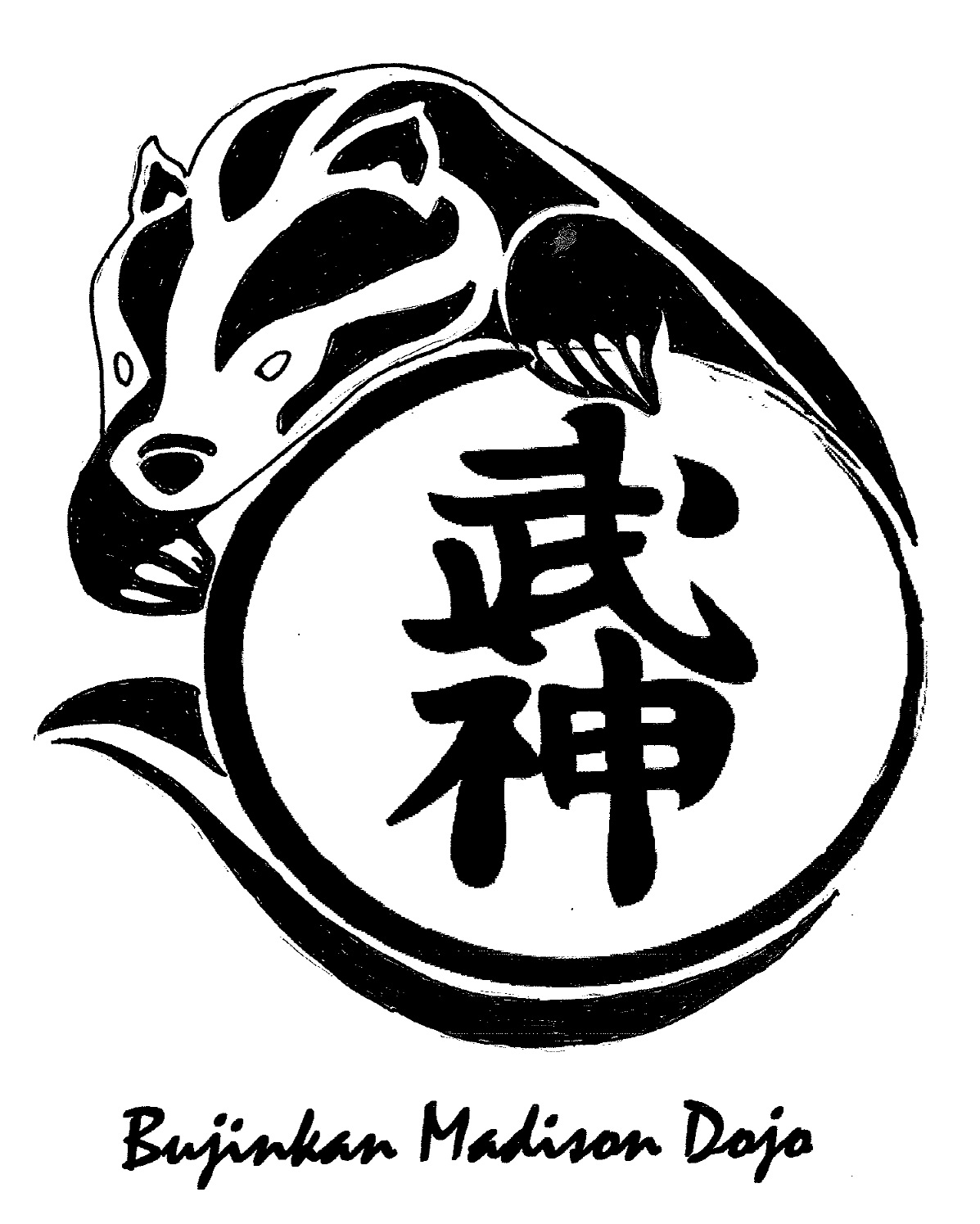– How has COVID-19 affected training?
- Masks are optional during training. If you’ve recently been exposed to someone sick, please wear a mask.
- Everyone is recommended to RSVP to Zoe (email, text, or in person) with at least 24 hour notice for each class (if no one RSVPs, class is cancelled).
- Students that are feeling any cold/flu symptoms are asked to not come to training.
- Payment structure is unchanged. See FAQ #6.
1. What are classes like at BMD?
The first half of class normally consists of some combination of ukemi (rolling/falling), striking, sanshin no kata (individual movement forms), kihon happo (8 basic techniques), or basic weapons training. The second half of class tends to be a more free form exploration of the basics in a variety of situations. The focus of any specific class varies between waza (specified attack/defense forms), taijutsu (empty-hand combat), or weapons. Some of the weapons studied include bo (6 ft staff), hanbo (3 ft staff), katana (sword), kusari (short rope/chain), tanto (knife), and more.
2. How is Bujinkan different from other martial arts?
Lots of modern martial arts are sport arts with a focus on competitions and specific rules. Bujinkan is a historical art that focuses on survival in a variety of situations. The main points of the art are efficiency of movement and the ability to either control your opponent or give yourself an opportunity to escape.
3. When is training?
See the “Class Information” page. There is also a calendar there that is updated regularly with class cancellations and location changes.
4. I’m going to be late to class / have to leave early, should I still come?
Yes, please come in either case. We’d rather have you train for an hour than not at all. If you’re planning to be late, please let us know since if no one shows up the instructor normally leaves after 15 minutes.
5. How do I get started?
Let us know in advance if you can. If not, check the calendar on the “Class Information” page for any class notices an hour beforehand and then just show up. You will need to sign a liability waiver before participating in training, which can be found here or on the “Links” page. (We have copies at the dojo if you don’t fill it out beforehand.) After filling out the waiver, you’ll participate in the first class while we cover basics. If we have time to get into more advanced techniques, we’ll ask you to observe that portion of class. After that first class, you’ll be able to participate in full training sessions going forward.
6. How much does training cost?
We operate on a pay what you want model. Dues are collected at the end of the month. The following are our suggested rates:
- $60 per month for all classes
- $20 per month for one class per week
- $5 or $10 per class
These are only guidelines. If you’re tight on cash or feel like training isn’t giving you as much, feel free to pay less than suggested. If you find the training amazing during a particular month, feel free to pay more for that month.
7. Do you have a free trial period?
Yes, with our pay what you want model we recommend that new students train for at least a month before making any payments. If you realize during that period that our training isn’t working out for you there are no financial obligations.
8. Do I have to sign a contract?
No, there is no contract. The only thing that you will need to sign is a liability waiver.
9. How do you take payments?
We will accept cash, check, Venmo, PayPal, or Zelle.
10. Can I get private lessons?
We do not offer private lessons. Our general classes are accessible to people of all training levels.
11. I don’t have previous martial arts experience …
Bujinkan is a different martial art than most others out there. No previous martial arts experience is necessary to start training with us.
12. I’m visiting Madison but I train at another Bujinkan dojo. Can I train with you?
Yes, visiting practitioners are always welcome. Try to let us know ahead of time, but feel free to join us any scheduled day. If you’d like to contribute to our dojo, see the rates listed above (#6).
13. Does BMD offer a kid’s class?
No, we do not offer a kid’s class at this time. Special considerations may be made for teenagers 15+ on a case by case basis, please contact us beforehand to discuss.
14. What should I wear to training?
When first starting out, wear whatever comfortable workout clothes you already have. After you’ve been training for a while you can order a training gi. Footwear options include barefoot, socks, or cotton soled tabi. No shoes or hard sole tabi are allowed on the mats. Barefoot is not allowed on the tile floor, so bring flip flops or socks if planning to train barefoot on the mats.
15. How often should I attend classes?
The more often that you train, the faster progress that you’ll make. We recommend attending 2 classes per week to make quicker progress, but if you can only make 1 class per week you are still welcome to train.
16. Is there a cheat sheet for all the Japanese phrases used during training?
Yes, you can find a copy of it here or on the “Links” page. Note, there is no expectation to memorize any of these words/phrases during the first few months of training.
17. Are there any competitions or sparring matches in Bujinkan?
Occasionally classes will feature randori training which is similar to controlled sparring but this is not a frequent occurrence. There are no competitions or tournaments in our art. Instead, as a dojo, we will host training seminars or travel to training seminars that other dojos are hosting. These seminars typically either feature a highly skilled guest instructor or are setup as a teaching exchange where all instructors present teach for a short period.
18. Do training sessions ever take place outside?
Weather permitting, we’ll train outdoors during the summer and fall occasionally. When there are home Badger football games on Saturdays, we’re unable to use the Neighborhood House parking lot, so we train at an alternate off-campus outdoor location.
19. How can I get updates on upcoming seminars, class cancellations, and other things?
Join our email list by clicking here. We use this to send out occasional emails about seminars, class cancellations, outdoor training, and other updates. You’ll normally only get a couple emails per month and you can remove yourself from the list at any time.
20. I haven’t felt comfortable training other martial arts because of who I am, how is BMD any different?
We appreciate the diversity of human beings and do not discriminate based on race, religion, ability, marital status, sexual orientation, sex or gender identity. Both owners (and lead instructors) are LGBTQIA women with a multiracial family.
21. I have more questions …
Please feel free to get a hold of us through the “Contact” page.



